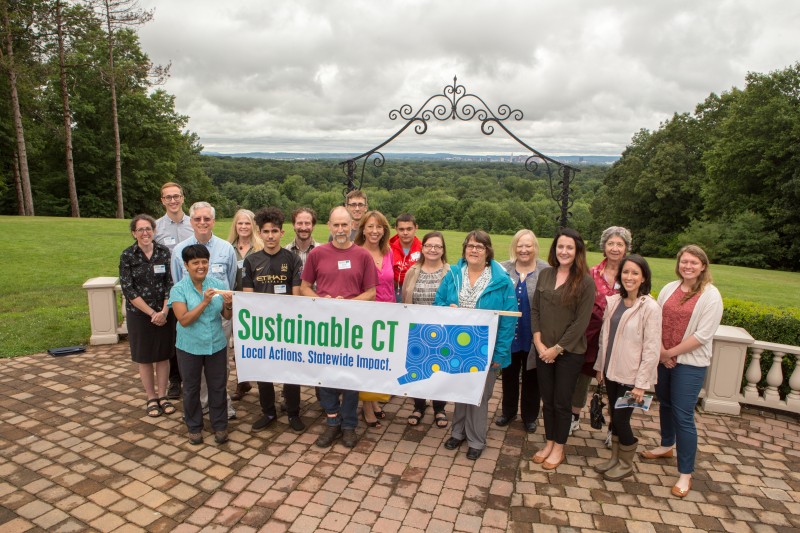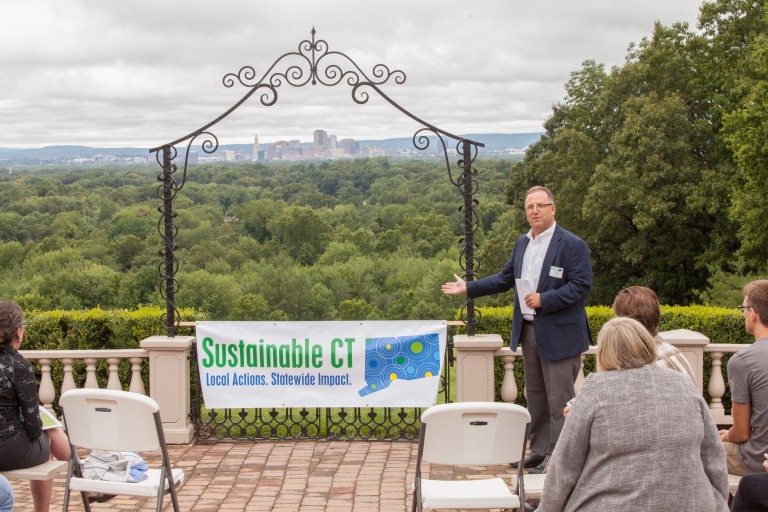- Apply
- Visit
- Request Info
- Give
Sustainable CT to Provide Path toward Livable Communities
Written by Ed Osborn
Published on July 28, 2017

The creators of “Sustainable CT,” an initiative to help communities become more vibrant and livable, gathered at Wickham Park in Manchester, CT, on July 24 to celebrate their accomplishments.
More than 200 municipal leaders and residents from across the state and people from key agencies, non-profits, businesses and the Connecticut Conference of Municipalities have collaborated to create the vision and framework for Sustainable CT. The Institute for Sustainable Energy at Eastern Connecticut State University is spearheading program development and coordination.
Sustainable CT, created by towns and for towns, is a certification program that will provide a roadmap of best practices and resources intended to help communities become more efficient, healthy, safe, resilient and livable. Leading up to the celebration, the Sustainable CT Advisory Committee held an all-day work session to make important decisions on program design and forthcoming action. The program will be further developed over the coming months, with an official launch scheduled for November.

Ted Shafer, First Selectman for the Town of Burlington and Chair of the Sustainable CT Advisory Committee, addresses partners and collaborators.
Ted Shafer, first selectman for the Town of Burlington and chair of the Sustainable CT Advisory Committee, thanked the crowd and said, “Sustainable CT is a gateway to creating more thriving, resilient, collaborative and forward-looking communities. I am honored to be working with all of you to create this positive vision and framework for our towns and our state.”
Municipal leaders on hand at the event expressed hope that, in the midst of Connecticut’s budget challenges, Sustainable CT can provide a positive vision to help engage residents in improving their communities and bring much needed resources and support to Connecticut towns. “We are excited to partner with the Institute for Sustainable Energy on this initiative,” said Joe DeLong, executive director of the Connecticut Conference of Municipalities.
“Sustainability actions, policies and investments deliver multiple benefits to all residents and help municipal leaders make efficient use of scarce resources and engage a wide cross-section of residents and businesses,” concluded DeLong.
Representatives from each of Connecticut’s 169 towns and cities have participated in the development of Sustainable CT. Many elected officials and town staff chaired committees and working groups. Other municipalities were represented by regional organizations that helped shape the program.
Over the past five months, eight working groups have developed a list of approximately 65 best practices to benefit Connecticut municipalities of all sizes. The emerging roadmap includes a broad range of actions, such as improving watershed management, supporting arts and creative culture, reducing energy use and increasing renewable energy, implementing “complete streets” (streets that meet the needs of walkers and bikers as well as cars), improving recycling programs, assessing climate vulnerability, supporting local businesses, and providing efficient and diverse housing options.
Tony Cherolis, a youth program coordinator of the BiCi Co program at the Center for Latino Progress (CPRF), is a newer member of the Sustainable CT Transportation Working Group. “I’m generally passionate about the role of transportation in equity and sustainability,” said Cherolis. “I’m becoming the coordinator for the Transport Hartford Academy at CPRF, where we will be providing opportunities for education, discussion, civic engagement and action supports for sustainable and multi-modal transportation options. Being on the Transportation Working Group is a way to bring that kind of engagement to other towns and municipalities that are also excited about this mission.”
The Emily Hall Tremaine Foundation, the Hampshire Foundation and the Common Sense Fund have provided seed funding to support the development of Sustainable CT. For more information visit www.sustainablect.org.


